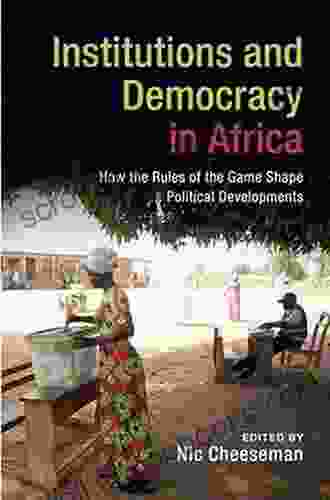How the Rules of the Game Shape Political Developments

Delving into the Intricate Web of Institutional Influence
In the realm of politics, the intricacies of institutional rules play a pivotal role in shaping the dynamics and outcomes that define our political landscape. The book "How the Rules of the Game Shape Political Developments" delves deep into this fascinating subject, offering a comprehensive exploration of how the 'rules of the game' govern power dynamics, electoral systems, policymaking processes, and much more.
This seminal work draws upon extensive comparative research to illuminate the profound impact that institutional rules exert on political behavior and developments across diverse societies. Through compelling case studies and rigorous analysis, the book unveils the mechanisms by which these rules shape the distribution of power, the outcomes of elections, the nature of policymaking, and the overall trajectory of political systems.
5 out of 5
| Language | : | English |
| File size | : | 4251 KB |
| Text-to-Speech | : | Enabled |
| Screen Reader | : | Supported |
| Enhanced typesetting | : | Enabled |
| Word Wise | : | Enabled |
| Print length | : | 380 pages |
Electoral Systems: Shaping the Composition of Government
One of the most fundamental aspects of any political system is its electoral system—the mechanism through which citizens choose their representatives. The book provides an in-depth examination of the different types of electoral systems, such as first-past-the-post, proportional representation, and mixed-member systems. Each system is meticulously analyzed to reveal its implications for the composition of government, the level of electoral competition, and the representation of diverse interests.
By comparing the outcomes across different electoral systems, the book sheds light on the profound consequences they have on the overall political landscape. For instance, it demonstrates how proportional representation systems tend to produce more fragmented parliaments with a wider range of political parties, while first-past-the-post systems often lead to two-party dominance and a less representative government.
Power Dynamics: The Allocation and Exercise of Authority
Beyond electoral systems, the book explores the intricate web of power dynamics that shape political developments. It examines how institutional rules govern the allocation and exercise of power among different political actors, including presidents, prime ministers, legislatures, courts, and political parties. Through meticulous analysis, the book unveils the ways in which these rules influence the decision-making processes, the balance of power, and the accountability of those in power.
By comparing the power dynamics in different political systems, the book reveals the profound impact that institutional design has on the nature of governance. For instance, it demonstrates how presidential systems tend to concentrate power in the hands of a single individual, while parliamentary systems typically distribute power more evenly across the executive and legislative branches.
Policymaking Processes: Shaping the Agenda and Outcomes
The book also delves into the complexities of policymaking processes, highlighting how institutional rules shape the agenda-setting, decision-making, and implementation of public policies. It analyzes the different roles played by legislatures, executives, bureaucracies, and interest groups in the policymaking process, and examines how institutional rules influence the outcomes of policy debates and the effectiveness of policy implementation.
Through comparative case studies, the book demonstrates how the design of legislative and executive institutions can have a significant impact on the policy agenda, the level of policy innovation, and the responsiveness of policymakers to public demands. For instance, it shows how strong legislative committees can play a pivotal role in shaping policy outcomes, while weak executives may struggle to implement their policy visions effectively.
: The Enduring Significance of Institutional Rules
In its concluding remarks, the book emphasizes the enduring significance of institutional rules in shaping political developments. It argues that the 'rules of the game' are not merely passive frameworks but active forces that exert a profound influence on the nature of political competition, the distribution of power, and the outcomes of policymaking. Understanding these rules is therefore essential for anyone seeking to comprehend the dynamics and trajectories of political systems.
"How the Rules of the Game Shape Political Developments" is an indispensable resource for scholars, policymakers, and anyone interested in the intricacies of political institutions and their impact on political developments. Its comprehensive analysis, compelling case studies, and insightful s provide a deep and nuanced understanding of the ways in which institutional rules govern the dynamics of political life.
5 out of 5
| Language | : | English |
| File size | : | 4251 KB |
| Text-to-Speech | : | Enabled |
| Screen Reader | : | Supported |
| Enhanced typesetting | : | Enabled |
| Word Wise | : | Enabled |
| Print length | : | 380 pages |
Do you want to contribute by writing guest posts on this blog?
Please contact us and send us a resume of previous articles that you have written.
 Book
Book Novel
Novel Page
Page Chapter
Chapter Text
Text Story
Story Genre
Genre Reader
Reader Library
Library Paperback
Paperback E-book
E-book Magazine
Magazine Newspaper
Newspaper Paragraph
Paragraph Sentence
Sentence Bookmark
Bookmark Shelf
Shelf Glossary
Glossary Bibliography
Bibliography Foreword
Foreword Preface
Preface Synopsis
Synopsis Annotation
Annotation Footnote
Footnote Manuscript
Manuscript Scroll
Scroll Codex
Codex Tome
Tome Bestseller
Bestseller Classics
Classics Library card
Library card Narrative
Narrative Biography
Biography Autobiography
Autobiography Memoir
Memoir Reference
Reference Encyclopedia
Encyclopedia Jacky Colliss Harvey
Jacky Colliss Harvey Bill Watterson
Bill Watterson Jay F Hemdal
Jay F Hemdal Jenna Mindel
Jenna Mindel Bill Wilke
Bill Wilke Prof Napoleon
Prof Napoleon Christine Davis
Christine Davis David Spiller
David Spiller Jeremy Black
Jeremy Black Bob Grove
Bob Grove W E B Du Bois
W E B Du Bois Beverly Kim
Beverly Kim Brandon Salo
Brandon Salo Bradley T Erford
Bradley T Erford Brian Bestall
Brian Bestall Brent L Sterling
Brent L Sterling Brian Surber
Brian Surber Billy Romp
Billy Romp Brian Cunningham
Brian Cunningham Brian Mccord
Brian Mccord
Light bulbAdvertise smarter! Our strategic ad space ensures maximum exposure. Reserve your spot today!

 Reginald Cox500 Years Ago, Attila Got the Competitive Edge: Now He Tells You How You Can...
Reginald Cox500 Years Ago, Attila Got the Competitive Edge: Now He Tells You How You Can...
 Maurice ParkerElevate Your Trombone Quartet with "El Manisero": A Masterpiece for Stage and...
Maurice ParkerElevate Your Trombone Quartet with "El Manisero": A Masterpiece for Stage and...
 Samuel Taylor ColeridgeAt The End Of The Day Vol. 1: A Collection of Heartfelt Reflections and...
Samuel Taylor ColeridgeAt The End Of The Day Vol. 1: A Collection of Heartfelt Reflections and... Leon FosterFollow ·18.7k
Leon FosterFollow ·18.7k Keith CoxFollow ·7.5k
Keith CoxFollow ·7.5k Kazuo IshiguroFollow ·4.5k
Kazuo IshiguroFollow ·4.5k Gerald ParkerFollow ·16.9k
Gerald ParkerFollow ·16.9k Ignacio HayesFollow ·5k
Ignacio HayesFollow ·5k Tyler NelsonFollow ·14.1k
Tyler NelsonFollow ·14.1k Bobby HowardFollow ·19.5k
Bobby HowardFollow ·19.5k Jeffery BellFollow ·6.9k
Jeffery BellFollow ·6.9k

 Corey Green
Corey GreenHuman Geography: A Concise Introduction by Gilbert...
A Journey into the Dynamic Realm of...

 Julian Powell
Julian PowellTrain Your Mind to Make Great Art a Habit
Do you dream of...

 Matthew Ward
Matthew WardSmall Town Romance: Heart Compass
Escape to Willow Creek, Where...

 Neil Parker
Neil ParkerMusic, Social Media, and Global Mobility: Exploring...
: The Convergence of Music, Media, and...

 Seth Hayes
Seth HayesUnlock the Potential of Potential Theory with Brooke...
Embark on an...
5 out of 5
| Language | : | English |
| File size | : | 4251 KB |
| Text-to-Speech | : | Enabled |
| Screen Reader | : | Supported |
| Enhanced typesetting | : | Enabled |
| Word Wise | : | Enabled |
| Print length | : | 380 pages |








